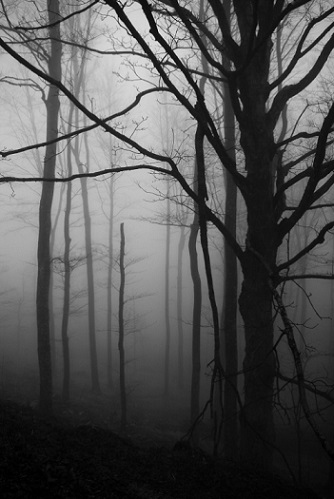In These Woods Alone: The Ecstatic Ache Of Creation.

{source}
The one with no mother and no father walks into a dying woods. The air there is still, soundless and as gray as smoke, too hollow for breathing.
The trees in these woods do not call themselves trees anymore; they are paper, rods without branches, as gray as the sky they pierce, and empty from the inside out. There are no exceptions. If the orphan reached out to touch one, her fingers would move straight through it.
If she wanted to bring the whole forest down, she could do it in a day. But the orphan does neither. She walks on.
Parched feet meet parched soil, and the cracks in her lips fill with dust. With each step, her thighs whisper together — her thighs, the only full rounded things left in the world. She walks until day turns to night and the woods around her is unchanged. And when the black of night again becomes day, the forest is the same.
But the orphan walks on; she moves closer to the center of the woods and the center of the woods moves closer to her, and the atmosphere thickens.
The air grows heavy with the texture of sound, but the weight increases so slowly, so minutely, that if you walked into these woods alone you would begin to lose hold of your sanity, would wonder at the buzzing in your ears that fattens and develops into voices in your head as surely and as imperceptibly as a baby grows thick with food.
But the orphan knows — by now, she knows — that the sounds do not come from inside her. The sounds live in the haze, thick as cream, hanging at the tops of the trees. The orphan has walked days now, or years perhaps, without stumbling, and she has carried the vibration in her ears until hum turned to roar.
A thought comes to her mind about what will happen next, and as it forms, it becomes. The smoke at the canopy rushes for her and into her ears, through her nose. Into the soft pink spots at the corners of her eyes slam the screams of everyone who has ever left her and everyone she has ever left.
She chokes on the voices of every man who never loved her and every woman she never loved. The cries of every man who ever loved her tunnel down her throat, and the cries of every woman she ever loved curl around her wrists as rope.
She moves forward, never stopping, hardly slowing, but staggering, and the screams of all the elder brothers she never had and all the baby sisters who will never be born force her to the forest floor. The sharp iron ground cuts her skin as she crawls over it. Her flesh tears, but does not bleed.
Through the woods the wails follow her, or she follows the wails. Her shoulders burn with their weight. The sun finds the sky and leaves it many times, and she drags herself until her skin hangs from her in sheets. The trail behind her is bloodless.

{source}
When the dry air behind her teeth begins to taste like copper, she looks up at last. In the moment she lifts her eyes, the screams of humanity are sucked back, away from her, leaving a soundlessness in their wake, full to its top with emptiness.
Before her rise billows of black smoke, the first variation in hue she has seen, maybe ever, maybe just since entering the woods. Beneath the smoke, a bottomless pool boils lava and embers, turning over itself endlessly. She would call it red, but she doesn’t know the word. The word she knows is anger. She kneels.
For 18 years, she sits unmoving at the edge of the gash in the earth. Black ash lines her lungs, and the tips of her hair sink into the soil like roots. Her nails grow long and crack off, and the ground around her is littered with the discarded pieces of the person she was moments before. She does not move or blink.
For 18 years, the orphan looks into the flaming heart of the woods. She cries, and shards of glass tumble from her eyes to her cheeks. They cut her; she does not bleed.
Dawn breaks on the morning of the first day of the 19th year. The orphan waits. The sun crosses over her the same way it has every day before today, cutting the sky like metal through metal. The orphan is empty in her mind and her veins.
When the slate rays of the sun brush the western earth, the moment arrives, and the pool of magma and ash before the orphan stills for the first time. All things alive and dead suspend in space. From the center of the pool blooms a rose, fully-formed.
For a moment, silence persists, and then a crack breaks across the air and the woods on all sides of its new creation ache with ecstasy, or pain, or both.
And at the place on the rose where green turns to red and stem turns to petal — the place where separate things connect — a drop of blood forms and rolls thickly, patiently, to the ground.
***
{Join us on Facebook, Twitter, Instagram & Pinterest}
